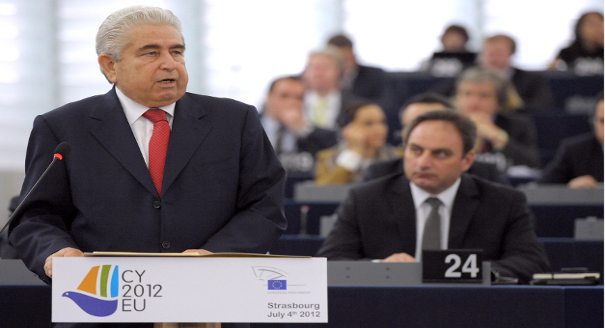The European Union’s rotating presidency has now shifted to Cyprus. But the country’s recent economic difficulties, combined with its long-lasting dispute with Turkey, are reason enough to expect that its presidency will indeed be challenging—both for the EU and for Cyprus itself.
The Cypriot economy is in difficulty. The country’s sovereign debt rating has been downgraded to junk by the major rating agencies. The banking sector suffers from its over-reliance on the benighted Greek economy. Loans to Greek businesses and households—€22 billion—have surpassed Cyprus’ GDP—€18 billion—according to the Financial Times’ Daniel Dombey. Yet, as both the president of the EU and a member of the eurozone, Cyprus is expected to co-anchor the EU’s deliberations on the eurozone crisis.
But even more importantly, the EU will be headed, for the first time in its history, by a state with an unresolved border dispute. Cyprus remains a divided island. As a result, the Cypriot government is not recognized by Turkey, a country in the midst of its own accession negotiations. Turkish leaders have stated clearly that during the Cypriot presidency, Turkey’s relationship with the EU will be frozen. In later statements, the Turkish position was clarified as a refusal to deal directly with the presidency. Turkey will, therefore, not attend any EU meetings chaired or convened by Cyprus, including Association Council and intergovernmental conferences.
The presidency is a problem for the Cypriot government as well. UN chaperoned negotiations between Greek and Turkish Cypriots have so far failed to mature into a settlement, but they are still ongoing. Real progress will require clear commitment to the end state of a unified Cyprus from both sides. Turkish and Greek Cypriot leadership will essentially have to reach agreement on thorny issues like power sharing and the territorial blueprint. They will then have to explain the principles of their consensus to their respective populations. The failure of the former Greek Cypriot leader, Tassos Papadopoulos, to back the settlement deal engineered with contributions from former UN Secretary General Kofi Annan in 2004 led to the failure of the referendum on the Greek side of the island. Yet the political leadership on the island will be hard pressed to fulfill the requirements of the EU presidency. They will have little room to engage in serious negotiations on sensitive topics with the Turkish Cypriots. A setup that certainly does not bode well for the settlement negotiations.
Against this backdrop, yet another source of potential conflict may actually turn out to be a blessing in disguise. The discovery of large offshore natural gas reserves in the waters surrounding the island has the potential to alter the atmospherics of this frozen conflict. The gas reserves are in an area that remains under dispute. Turkey, a guarantor power, has made it clear that it will not allow the unhindered exploration of this resource if a political settlement is not reached. Paradoxically, therefore, this looming conflict over gas resources may provide the true incentive for Greek and Turkish Cypriots to reach a lasting settlement. The prospect of an improved economic future could very possibly lead to a fundamental reassessment of the political trade-offs, opening the way to a real settlement that hitherto proved to be far too elusive.






